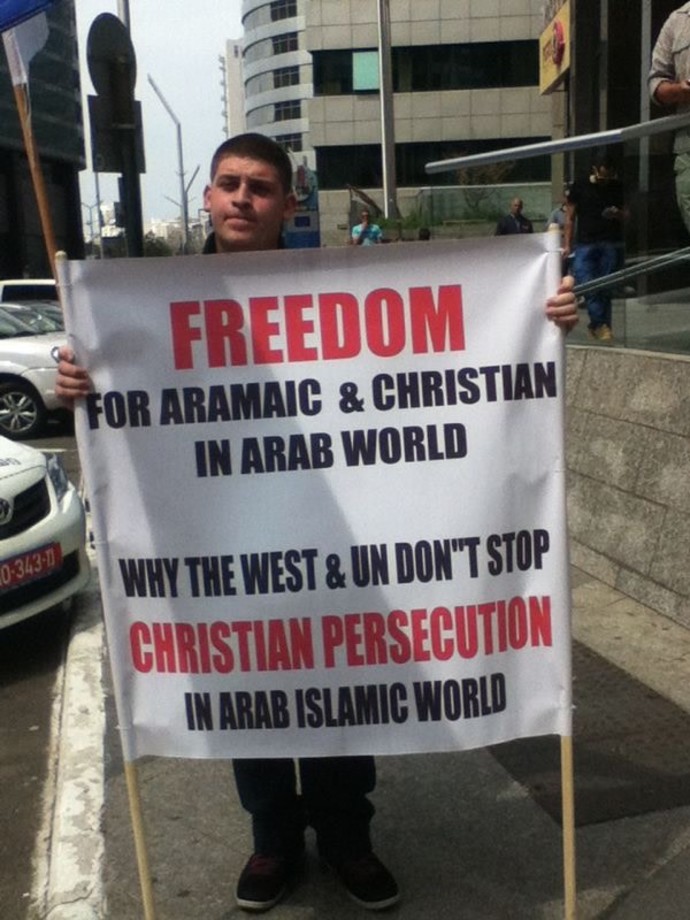Two percent of Israel's population - 180,000 people - are Christian, according to the Central Bureau of Statistics. Who are these people?
According to Amit Barak, a Jewish man from the heavily Christian Israeli city of Nazareth, they are probably not who you think.
Barak has devoted his career to helping Christians integrate into Israeli society.
After years of working closely with Father Gabriel Nadaf, a Greek Orthodox priest of Nazareth, encouraging Christians living in northern Israel to see themselves as loyal citizens of Israel, Barak more recently co-founded the Jerusalemite Initiative to bring this idea to the Christians of the Holy City.
Here are five things most people don’t know about Israel’s Christian population.
No.1: 90% of Arab Christians in Israel are Greek Catholic or Greek Orthodox
Barak estimates that there are about 185,000 Christians living in Israel today. Most live in Nazareth, Haifa and Shefaram in the north, or in Jerusalem. About 80% of them identify as Arab Christians and the rest are dispersped among various Christian denominations.
Approximately 90% of Arab Christians belong to the Greek Catholic Church or the Greek Orthodox Church. There are very few Protestants living in Israel.
No. 2: Christians in Israel date back to the 12th century
Many Christians in Israel are descended from people who lived in the region before Christianity even began. Some of Israel’s Catholics are descended from 12th- and 13th-century Crusaders.
In the early 20th century, a group of Armenian Christians came to Palestine to escape the bloody Armenian Revolt (1894-1920). They joined a small community of Armenians who were already living in Jerusalem. Around the same time, a group of Copts came from Egypt to settle in Palestine and their descendants are also still in the country, too.
Israel is also home to a small group of what Barak called “New Christians” who are primarily associated with Protestant denominations.
No. 3: Many aren’t actually Arab; they are Aramaean
According to Barak, the traditional Christian Aramaean language (Aramaic) and culture was replaced by the Arabic language and culture so thoroughly that many Christians who are actually of Aramaean descent no longer understand the true historical roots of Christians in Israel. Their Aramaean roots and culture has been nearly eradicated by hundreds of years of Arabic culture and language.
In 2014, Christian Arabs, most of whom have no connection to Arab identity except for being first-language Arabic speakers, became eligible to re-register with the Israeli population registry as Aramaeans.
<br><strong>No. 4: They speak English</strong>
While Arabic is the first language of Israel’s Christians, many also speak English.
Most Christians in Israel attend church-sponsored private schools where, depending on the church, they also learn Greek, Latin, German, French or Spanish. Christians in Jerusalem don’t study Hebrew, but other Christians do.
In general, as a result of their private schooling, Christians are among the most well-educated in Israel, Barak said. It’s not unusual to find Christians serving in important positions in Israel’s government, medical, law enforcement and judicial systems.
No. 5: Some Christians 'identify as Israeli'
The Christians in Israel’s North are Israeli citizens and do not identify as Palestinians, Barak explained, and they are often supportive of Israel. Though, he said that many keep their support of Israel to themselves because they live among a largely anti-Israel Muslim population.
“If the Christians keep quiet, they will not be harmed... The more they identify as Israelis, the more uncomfortable it is for them," he explained.
Father Nadaf and other outspoken priests and activists have been threatened with violence for expressing a desire to better integrate into Israeli society.
In Jerusalem, the situation is even more charged. Many Jerusalem-area Christians don’t hold Israeli citizenship and, according to Barak, the majority of Christian families living in Jerusalem have family living in Palestinian Authority- controlled areas. As such, the process of integrating Jerusalem's Christians into Israeli society has been much slower, he said.
"They don’t learn Hebrew in school, so we provide them with private Hebrew courses for free,” Barak said.
He is optimistic that the younger generation of Israeli Christians is deciding to be more Israeli.
Of the approximately 1,800 Christians who graduate high school every year, the numbers who join the IDF or volunteer for National Service have tripled since 2013. Part of that, according to Barak, is helping the Christians change their identity from Arab to Aramean and helping them reclaim their ancient culture.
“It’s still a process. It’s a marathon, but it’s changing,” he said.

According to Barak, Christians in Israel have freedom of religion and life for them is particularly good.
He called on Christian Zionists to help support Israeli Christians, because he said anti-Israel churches are doing a lot of damage.
“I believe, as a Zionist,” he said, “that if there are minorities in Israel who want to be part of Israel, we should help them.”
